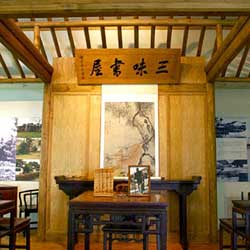
The Former Residence of Lu Xun (1881-1936), a Chinese style home built around a courtyard, is situated near Fuchengmen in the West City District. The easternmost room in the northern side of the courtyard belonged to Lu Xun' s mother and the western room to Lun Xun' s wife. The rooms on the southern side of the courtyard served as a sitting room and library. Attached to the northern side of the courtyard is a small room known as the "Tiger Tail," which was used as his study and bedroom.
Lu Xun bought the house in February 1923 with money borrowed from friends, and in the two years and three months that he lived there he wrote Tomb, Wild Grass, Aureole Anthology, Aureole Anthology Part II and the famous collection of short stories entitled uncertainty. As well he completed a large number of translations. Next to the "Tiger Tail"is a tiny garden with a thorny plum tree which, together with the lilac tree in the front courtyard, were planted by Lu Xun himself.
After 1949, Lu Xun's wife Xu Gaungping donated the residence to the state, and in 1856 the government turned it into the Lu Xun Museum. The museum' s courtyard is filled with flowers and trees. Inside the main entrance of the exhibition hall facing the doorway is a commemorative verse, in front of which stands a bronze bust of Lu Xun.
The first section of the exhibition displays photographs, unpublished manuscripts and letters the writer left behind on his death. Included here are photographs of his hometown of Shaoxing in Zhejiang Province and pictures of the scenes described in his short stories. On display are also an anatomy notebook that he used when he studied in Japan, a copy of the magazine New Youth which carried his first short story "Diary of a Madman" and a proof copy of Qu Qiubai' s Collected Narrations Written at Sea (Haishang Shulin) which Lu Xun proofread for the author. The exhibit, which attracts the most attention, is the facsimile of the diary that Lu Xun wrote the day before he died.
On display in the second section of the exhibition are a collection of photographs of Chinese and foreign memorial activities held on the occasion of Lu Xun' s death, Lu Xun' s works translated into 24 different languages, and a set of the Complete Works of Lu Xun published in 1938.
Lu Xun' s library of 16,000 books stands to the west of the exhibition hall. Many of the volumes on display were re-bound by Lu Xun himself.
The Lu Xun Museum was official opened on October 19, 1956 to mark the 20th anniversary of the writer' s death. In 1980, the museum was expanded. The museum now houses an exhibition of Luxun' s life from his youth in Shaoxing to his death in Shanghai.
Address: 19 Fuchengmen Gongmen Ertiao;
Entry ticket: 5 yuan;
Opening hours: 9 AM-3:30 PM, closed on Mondays;
Transport: Bus No.s 719, 44, 387, 103, 102 and 101;
Tel: 86-10-66156549/8.
(China.org.cn September 9, 2005)
|

